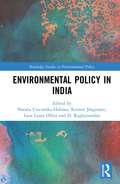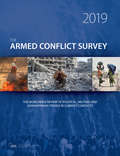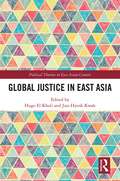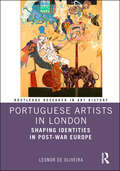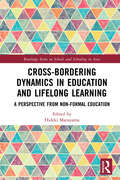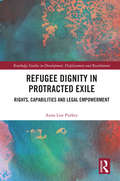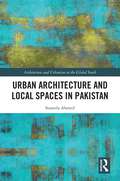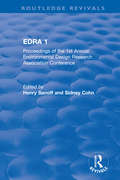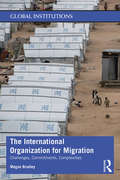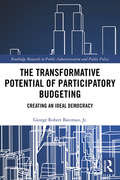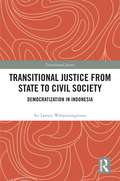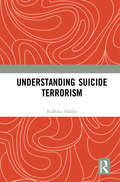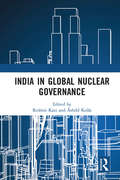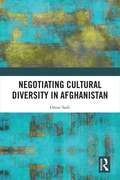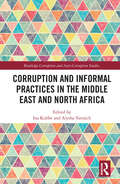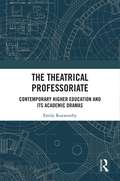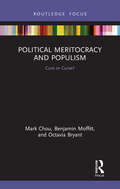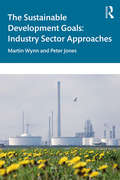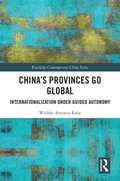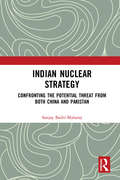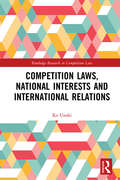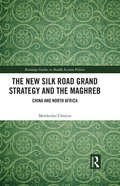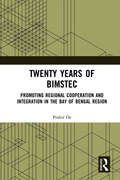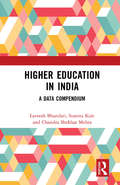- Table View
- List View
Environmental Policy in India (Routledge Studies in Environmental Policy)
by Natalia Ciecierska-Holmes Kirsten Jörgensen Lana Laura Ollier D. RaghunandanThis book systematically introduces historical trajectories and dynamics of environmental policy and governance in India. Following the features of environmental policy in India as outlined in Chapter 1, subsequent chapters explore domestic and international factors that shape environmental policy in the country. The chapters examine the interplay between governmental and non-governmental actors, and the influence of social mobilisation and institutions on environmental policy and governance. Analysing various policy trajectories, the chapters identify and explore five central environmental policy subsystems: forests, water, climate, energy and city development. The authors drill down into the social, economic, political and ecological dimensions of each system, shedding light on why striking a balance between national economic growth and environmental sustainability is so challenging. Drawing on political science theories of policy processes and related theoretical concepts, this innovative edited volume will be of great interest to students and scholars of environmental policy and politics and South Asian studies more broadly.
Armed Conflict Survey 2019
by The International Institute for Strategic StudiesThe Armed Conflict Survey provides in-depth analysis of the political, military and humanitarian dimensions of all major armed conflicts, as well as data on fatalities, refugees and internally displaced persons. Compiled by the IISS, publisher of The Military Balance, it is the standard reference work on contemporary conflict. The book assesses key developments in 36 high-, medium- and low-intensity conflicts, including those in Iraq, Syria, Afghanistan, South Sudan, Israel–Palestine, Southern Thailand, Colombia and Ukraine. The Armed Conflict Survey features essays by some of the world’s leading experts on armed conflict, including Mats Berdal, Elisabeth Jean Wood, Julia Bleckner, Nelly Lahoud, William Reno and Carrie Manning. They write on: • UN peacekeeping; • conflict-related sexual violence; • the Islamic State’s shifting narrative; • the changing foundations of governance by armed groups; and • rebel-to-party transitions. The authors’ discussion of principal thematic and cross-national trends complements the detailed analysis of each conflict at the core of the book. The Armed Conflict Survey also includes maps, infographics and multi-year data, as well as the IISS Chart of Conflict.
Global Justice in East Asia (Political Theories in East Asian Context)
by Hugo El Kholi Jun-Hyeok KwakAs a fascinating study of global justice in Asia, this book presents a series of contributions reflecting upon the conditions of a greater involvement of East Asian traditions of thought in the debate on global justice. Including chapters on diverse issues such as global social inequalities, human rights practice and the functioning of international institutions, this book examines the political cultures of East Asia in order to help political theorists better appraise the distinctiveness of non‐Western ideas of justice. Confirming the persistence of a strong social ethos, the contributions also demonstrate the long-lasting influence of Buddhism, Taoism and Confucianism in shaping East Asian public conceptions of justice. Bringing much needed non-Western voices to the global justice debate, this book will appeal to students and scholars of politics, law and philosophy, as well as activists involved in the global justice movement.
Portuguese Artists in London: Shaping Identities in Post-War Europe (Routledge Research in Art History)
by Leonor de OliveiraThis book centres on four Portuguese artists’ journeys between Portugal and Britain and aims at rethinking the cultural and artistic interactions in the post-war Europe, the shaping of new identities within a context of creative experimentalism and transnational dynamics and the artistic responses to political troubles. Leonor de Oliveira examines the contributions of the work of Paula Rego, Barto dos Santos, João Cutileiro and Jorge Vieira, among other artists, to shape referential images of Portuguese identity that not only responded to the purpose of breaking with dominant iconographic and aesthetic representations but also incorporated a critical perspective on contemporaneity. This title will appeal to scholars interested in art history, Portuguese and European art, and the mid-twentieth-century art scene.
Cross-Bordering Dynamics in Education and Lifelong Learning: A Perspective from Non-Formal Education (Routledge Series on Schools and Schooling in Asia)
by Hideki MaruyamaEducation as a concept has long been taken for granted. Most people immediately think of schools and colleges, of classes and exams. This volume aims to highlight non-formal education (NFE) in its various forms across different historical and cultural contexts. Contributors draw upon their experience as educators and researchers in comparative education and sociology to elucidate, compare, and critique NFE in Asia, Europe, Latin America, and the USA. By mapping out NFE’s forms, functions, and dynamics, this volume gives us the opportunity to reflect on the myriad iterations of education to challenge preconceived limitations in the field of education research. Only by expanding the focus beyond that of traditional schooling arrangements can we work towards a more sustainable future and improved lifelong learning. This book will appeal to researchers interested in non-formal education and comparative education.
Refugee Dignity in Protracted Exile: Rights, Capabilities and Legal Empowerment (Routledge Studies in Development, Displacement and Resettlement)
by Anna Lise PurkeyThis book investigates how effective human rights and the inherent dignity of refugees can be secured in situations of protracted exile and encampment. The book deploys an innovative human rights-based capabilities approach to address fundamental questions relating to law, power, governance, responsibility, and accountability in refugee camps. Adopting an original theoretical framework, the author demonstrates that legal empowerment can change the distribution of power in a given refugee situation, facilitating the exercise of individual agency and assisting in the reform of the opportunity structure available to the individual. Thus, by helping to increase the capability of refugees to participate actively in the decisions that most affect their core rights and interests, participatory approaches to legal empowerment can also assist in securing other capabilities, ultimately ensuring that refugees are able to live dignified lives while in protracted exile. Ultimately, the book demonstrates that legal empowerment of refugees can bring lasting benefits in establishing trust between refugees, the state, and local communities. It will be of interest to researchers within the fields of refugee studies, international law, development studies, and political science, as well as to policy-makers and practitioners working in the fields of refugee assistance and humanitarian intervention.
Urban Architecture and Local Spaces in Pakistan (Architecture and Urbanism in the Global South)
by Suneela AhmedThis book is set in Karachi, Pakistan and investigates the possibility of achieving localness through identifying urban process and their impact on built form, addressing how locals associate with the urban spaces and how they value it. Thus, the investigation, using the local terminology maqamiat, goes beyond the physicality of space and develops a framework that helps to understand the social, ethnic, economic, ecological and other the non-physical aspects of space, which are of value to the locals. The aim is to investigate the possibility of achieving localness through identifying urban design elements that can be incorporated into the process of designing new built forms that acknowledges what is valued by the locals instead of superimposing imported designs, negating the contextual realties, both physical and social. For this purpose, the book includes three case studies from Karachi. The book questions the aspiration of many cities in the South Asian context to imitate the built forms of Western cities (increasingly, Singapore and Shanghai) which are viewed as modern and represents future. The book will make a theoretical contribution to the existing literature on postcolonial urbanism and explore space from a local vantage point for understanding how to look inwards for aspiration.
EDRA 1: Proceedings of the 1st Annual Environmental Design Research Association Conference (Routledge Revivals)
by Henry Sanoff; Sidney CohnOriginally published in 1970, EDRA 1 is a record of the conference proceedings of the 1st annual Environmental Design Research Association conference. The papers featured in this volume represent the proceedings of the conference and are concerned mainly with contributions of scientific disciplines towards the creation of improved methods of problem-solving environmental design, as well as understanding the nature of human responses to the environment. The papers included in this volume focus on developing models and methods towards a framework of coherence and definable structure of environmental design, with the ultimate objective of achieving an optimum environment for man. This volume will be of great interest to planners, architects and academics of urbanisation alike. Although published over 40 years ago, the book’s content is still as relevant and interesting today as it was at the time of publication.
The International Organization for Migration: Challenges, Commitments, Complexities (Global Institutions)
by Megan BradleySince its establishment in 1951, the International Organization for Migration (IOM) has expanded from a small, regionally specific, logistically focused outfit into a major international organization involved in an almost dizzying array of activities related to human mobility. In 2016, IOM joined the UN system and has rebranded itself as the "UN migration agency." Despite its dramatic expansion and increasing influence, IOM remains understudied. This book provides an accessible, incisive introduction to IOM, focusing on its humanitarian activities and responses to forced migration – work that now makes up the majority of the organization’s budget, staff, and field presence. IOM’s humanitarian work is often overlooked or dismissed as a veil for its involvement in other activities that serve states’ interests in restricting migration. In contrast, Bradley argues that understanding IOM’s involvement in humanitarian action and work with displaced persons is pivotal to comprehending its evolution and contemporary significance. Examining tensions and controversies surrounding the agency’s activities, including in the complex cases of Haiti and Libya, the book considers how IOM’s structure, culture, and internal and external power struggles have shaped its behaviour. It demonstrates how IOM has grown by acting as an entrepreneur, cultivating autonomy and influence well beyond its limited formal mandate. The International Organization for Migration is essential reading for students and scholars of migration, humanitarianism, and international organizations.
The Transformative Potential of Participatory Budgeting: Creating an Ideal Democracy (Routledge Research in Public Administration and Public Policy)
by George Robert Bateman, Jr.In this book, George Robert Bateman, Jr. presents a philosophical examination of the potential benefits of participatory budgeting (PB), with recommendations of how they might be realized. The work of social philosophers like Thomas Jefferson, John Dewey, Robert Putnam are studied to better understand the potential benefits and their effect on individuals and communities. Using social provisioning and John Fagg Foster’s theories of instrumental value and institutional adjustment, Bateman demonstrates how participatory budgeting in New York City (PBNYC) can realize its full potential and transform individual participants into their better selves and also transform their communities. This transformation can occur when participants are able to make decisions about things that matter in their lives. As more of us become empowered and actively engaged in deliberations concerning local economic/political issues the more we will experience public happiness, greater understanding of others, greater development of our morality, and an increased sense of belonging. The Transformative Potential of Participatory Budgeting will be of great interest to scholars in the fields of normative political theory, political philosophy, local politics, heterodox economics, institutional economics, political sociology, urban sociology, and community sociology.
Transitional Justice from State to Civil Society: Democratization in Indonesia
by Sri Lestari WahyuningroemThis book is the first to offer an in-depth analysis of transitional justice as an unfinished agenda in Indonesia’s democracy. Examining the implementation of transitional justice measures in post-authoritarian Indonesia, this book analyses the factors within the democratic transition that either facilitated or hindered the adoption and implementation of transitional justice measures. Furthermore, it contributes key insights from an extensive examination of ‘bottom-up’ approaches to transitional justice in Indonesia: through a range of case studies, civil society-led initiatives to truth-seeking and local reconciliation efforts. Based on extensive archival, legal and media research, as well as interviews with key actors in Indonesia’s democracy and human rights’ institutions, the book provides a significant contribution to current understandings of Indonesia’s democracy. Its analysis of the failure of state-centred transitional justice measures, and the role of civil society, also makes an important addition to comparative transitional justice studies. It will be of considerable interest to scholars and activists in the fields of Transitional Justice and Politics, as well as in Asian Studies.
Understanding Suicide Terrorism
by Radhika HalderUnderstanding Suicide Terrorism aims to explore the different aspects involved in suicide terrorism for a better understanding of the tactic which has become a global phenomenon and threat today. The book aims to help inform holistic policy making by tracing the evolution of the use of suicide as a weapon in conflict and the emergence of modern-day suicide terrorism. The book uses case studies of prominent terror outfits to have used the tactic rather confidently and consistently and suggests that suicide terrorism must be understood as the interplay of three vital components—the individual committing the act, the organization employing the tactic and, the state environment contributing to the culture of suicide terrorism. Subsequently, a purely weapons-based approach to counter terrorism cannot be relied upon to solve a threat such as suicide terrorism which is so deeply ingrained in ideology and symbolism. The book comes at a time when suicide terrorism has been one of the most potent and effective tools for individuals and entities to achieve what they perceive as goals and shall inevitably remain a challenge for policy makers and security establishments to deal with. Please note: Taylor & Francis does not sell or distribute the Hardback in India, Pakistan, Nepal, Bhutan, Bangladesh and Sri Lanka
India in Global Nuclear Governance
by Reshmi Kazi and Åshild KolåsIn the prevailing international security situation, the world community, including India believes nuclear security must be conferred high priority for global peace and security. As a responsible member of this community, India finds itself prioritising this aspect more than ever before. The volume is a revisit of the Indian nuclear discourse. It envisages a comprehensive and predictable nuclear governance architecture for the future, and discusses how India might play a proactive role in this effort. Please note: T&F does not sell or distribute the hardback in India, Pakistan, Nepal, Bhutan, Bangladesh and Sri Lanka.
Negotiating Cultural Diversity in Afghanistan
by Omar SadrThis book analyses the problematique of governance and administration of cultural diversity within the modern state of Afghanistan and traces patterns of national integration. It explores state construction in twentieth-century Afghanistan and Afghan nationalism, and explains the shifts in the state’s policies and societal responses to different forms of governance of cultural diversity. The book problematizes liberalism, communitarianism, and multiculturalism as approaches to governance of diversity within the nation-state. It suggests that while the western models of multiculturalism have recognized the need to accommodate different cultures, they failed to engage with them through intercultural dialogue. It also elaborates the challenge of intra-group diversity and the problem of accommodating individual choice and freedom while recognising group rights and adoption of multiculturalism. The book develops an alternative approach through synthesising critical multiculturalism and interculturalism as a framework on a democratic and inclusive approach to governance of diversity. A major intervention in understanding a war-torn country through an insider account, this book will be of great interest to scholars and researchers of politics and international relations, especially those concerned with multiculturalism, state-building, nationalism, and liberalism, as well as those in cultural studies, history, Afghanistan studies, South Asian studies, Middle East studies, minority studies, and to policymakers.
Dangerous Decade: Taiwan’s Security and Crisis Management
by Brendan TaylorTaiwan’s position looks increasingly precarious, and tensions threaten to grow into a major strategic crisis. Chinese President Xi Jinping has made reunification with Taiwan a central pillar of his vision for China, and has ramped up diplomatic and economic pressure on Taiwan. Its inhabitants are increasingly estranged from the mainland, and Tsai Ing-wen’s administration refuses to conduct relations with China on Beijing’s terms. Taiwan could take on renewed strategic significance amid the backdrop of the deepening rivalry between China and the United States, and find itself at the centre of a Cold War-style superpower confrontation. While Washington’s support and military power has historically guaranteed Taiwan’s security, this is no longer a certainty. This Adelphi book argues that China’s military modernisation has changed the cross-strait military balance, and the ability of the US to prevail in a conflict over Taiwan may have evaporated by 2030. As China feels increasingly empowered to retake Taiwan, there is significant potential for escalation, particularly given the ambiguity of Beijing’s ‘red lines’ on Taiwan. Neither Beijing, Taipei nor Washington want such a conflict, but each is challenging the uneasy status quo. Taylor calls for the introduction of a narrower set of formal crisis-management mechanisms designed to navigate a major Taiwan crisis.
Corruption and Informal Practices in the Middle East and North Africa (Routledge Corruption and Anti-Corruption Studies)
by Ina Kubbe Aiysha VarraichThis book investigates the pervasive problem of corruption across the Middle East and North Africa. Drawing on the specifics of the local context, the book explores how corruption in the region is actuated through informal practices that coexist and work in parallel to formal institutions. When informal practices become vehicles for corruption, they can have negative ripple effects across many aspects of society, but on the other hand, informal practices could also have the potential to be leveraged to reinforce formal institutions to help fight corruption. Drawing on a range of cases including Morocco, Lebanon, Turkey, Jordan, Tunisia or Israel the book first explores the mechanisms and dynamics of corruption and informal practices in the region, before looking at the successes and failures of anti-corruption initiatives. The final section focuses on gender perspectives on corruption, which are often overlooked in corruption literature, and the role of women in the Middle East. With insights drawn from a range of disciplines, this book will be of interest to researchers and students across political science, philosophy, socio-legal studies, public administration, and Middle Eastern studies, as well as to policy makers and practitioners working in the region.
The Theatrical Professoriate: Contemporary Higher Education and Its Academic Dramas
by Emily RoxworthyThis book argues that today’s professoriate has become increasingly theatrical, largely as a result of neoliberal policies in higher education, but also in response to an anti-intellectual scrutiny that has become pervasive throughout the Western world. The Theatrical Professoriate: Contemporary Higher Education and Its Academic Dramas examines how the Western professoriate increasingly finds itself enacting command performances that utilize scripting, characterization, surrogation, and spectacle—the hallmarks of theatricality—toward neoliberal ends. Roxworthy explores how the theatrical nature of today’s professoriate and the resultant glut of performances about academia on stage and screen have contributed to a highly ambivalent public fascination with academia. She further documents the "theatrical turn" witnessed in American higher education, as academic institutions use performance to intervene in the diversity issues and disciplinary disparities fueled by neoliberalism. By analyzing academic dramas and their audience reception alongside theoretical approaches, the author reveals how contemporary academia drives the professoriate to perform in what seem like increasingly artificial ways. Ideal for practitioners and students of education, ethnic, and science studies, The Theatrical Professoriate deftly intervenes in Performance Studies’ still-unsettled debates over the differential impact of live versus mediated performances.
Political Meritocracy and Populism: Cure or Curse? (Routledge Studies in Anti-Politics and Democratic Crisis)
by Benjamin Moffitt Mark Chou Octavia BryantOffering the first in-depth analysis of the relationship between populism and political meritocracy, this book asks why states with meritocratic systems such as Singapore and China have not faced the populist challenge to the extent that liberal democratic states have. Is political meritocracy immune to populism? Or does it fan its flames? Exploring this puzzle, the authors argue that political meritocracies are simultaneously immune and susceptible to populism. The book maintains that political meritocracy’s focus on the intellect, social skills, and most importantly virtue of political leaders can reduce the likelihood of populist actors rising to power; that meritocracy’s promise of upward mobility for the masses can work against elitism; and that rule by the ‘meritorious’ can help avoid crises, diminishing the political opening for populism. However, it also shows that meritocracy does little to eliminate grievances around political, cultural, and social inequality, instead entrenching a hierarchy – an allegedly ‘just’ one. The book ultimately argues that the more established the system of political meritocracy becomes, the more it opens the door to populist resentment and revolt. Pitched primarily to scholars and postgraduate students in political theory, comparative politics, Asian studies, and political sociology, this book fills an important scholarly gap.
The Sustainable Development Goals: Industry Sector Approaches
by Martin Wynn Peter JonesIn 2015, the United Nations launched the Sustainable Development Goals (SDGs) to define and coordinate global priorities and aspirations up to 2030 in response to the economic, social and environmental challenges faced by the planet. Many governments across the world signed up to these goals. United Nations Secretary-General Ban Ki-Moon noted at the outset that business would be a vital partner in achieving the SDGs. This easy-to-digest book provides a critical evaluation of how a range of multinational companies from across different commercial sectors are currently addressing the SDGs and the challenges they are facing in contributing to them. The private sector has thus been set the challenge of responding positively in support of the SDGs whilst at the same time acting in the shorter-term interests of its stakeholders. Using a wealth of illustrative materials drawn from company reports and other sources, this book looks at the response of 80 companies and organisations from eight different industry sectors. It examines the different approaches taken, discusses how far the SDGs are actively supported and reviews how progress is being assessed against related targets and objectives. In addition to an analysis of each industry sector, the book provides a summary overview of all industry sectors studied, identifying the most and least supported SDGs overall. This book will be of interest to the fast-growing body of academics studying and researching sustainability, as well as to industry managers and public-sector operators involved in sustainability management and reporting. It provides detailed commentary and insights, and identifies both key themes from the research and critical issues for the successful implementation of the SDGs in the period up to 2030.
China’s Provinces Go Global: Internationalization Under Guided Autonomy (Routledge Contemporary China Series)
by Wiebke Antonia RabeThis book provides novel insights into how Chinese provinces have developed into major sources of China’s outbound investments. Focusing on the Yangtze River Delta region, the book compares two provinces with highest outbound investment in China, Jiangsu and Zhejiang and traces how locality-unique conditions contribute to the economic internationalization of Chinese provinces. Through its in-depth exploration of these case studies, the book reveals how the deficiency of enterprises’ investment capacity heavily depends on the unique political, economic, formal and informal institutions of each province. The findings presented in this book also offer conclusions relevant to the study of the internationalization process of emerging economies engaging in outward investment, such as India and Brazil. Featuring insights from interviews with scholars, managers and government officials this will be an invaluable resource for scholars, students and professionals interested in International Economics, International Political Economy, Chinese Studies and Asian Studies.
Indian Nuclear Strategy: Confronting the Potential Threat from both China and Pakistan
by Sanjay Badri-MaharajThis book examines India’s nuclear strategy as it confronts the potential threat from both China and Pakistan. The potential threats - traditional as well as non-traditional CBRN threats - will be examined as will India’s approach to dealing with them. India’s nuclear arsenal, its dual purpose civil-military space program and its nascent BMD capability will be explored with a view to informing the reader as to the steps taken by India to confront its nuclear challenges. Please note: Taylor & Francis does not sell or distribute the Hardback in India, Pakistan, Nepal, Bhutan, Bangladesh and Sri Lanka
Competition Laws, National Interests and International Relations (Routledge Research in Competition Law)
by Ko UnokiMost of the competition laws currently enforced by states aim to protect consumer welfare and promote fair competition by regulating against anti-competitive behavior. Yet, despite the shared objectives, the global community does not have a common global competition law. In exploring the reasons for this, this book takes a unique interdisciplinary approach by using international relations theories to illustrate the relationship between the enforcement of competition laws and international relations through an analysis of competition cases relating to cartels, extraterritoriality, and corporate mergers and acquisitions. Through an examination of this relationship, this book will argue on why the views held by state leaders on the condition of international relations may at times lead them to either arbitrarily over-enforce or disregard their competition laws to the detriment of fair competition and consumer welfare. This book also provides suggestions for global business investors who face competition law issues on how they may accommodate such views.
The New Silk Road Grand Strategy and the Maghreb: China and North Africa (Routledge Studies in Middle Eastern Politics)
by Mordechai ChazizaExamining Chinese-North African relations through the lens of President Xi Jinping’s Silk Road grand strategy, this book offers a comprehensive analysis of emerging strategic and economic partnerships in the Maghreb region. China’s ‘Belt and Road Initiative’ (BRI) is one of the most ambitious infrastructure projects in modern history. This book argues that the BRI framework is vital in understanding the shifting balance of power within the Maghreb region and between the North African countries, the EU, the US, and China. It is argued that an increasing interdependence can be observed between China and the Maghreb in energy, construction, infrastructure building, political ties, trade and investments, financial integration, people-to-people bonds, and defence. The author reveals the complexities and challenges of Beijing's BRI, exploring how this synergy will shape the Maghreb in the future. Additionally, the book argues that the balance of global politics will be critically affected by these emerging partnerships. The book will be of particular interest to students and academics focused on interstate dynamics and foreign policy in the West Asia and North Africa (WANA) region, but in its global ramifications the book is also much-needed reading for those working in International Relations, Politics and Economics, and Public Policy.
Twenty Years of BIMSTEC: Promoting Regional Cooperation and Integration in the Bay of Bengal Region
by Prabir DeThis book reviews the past and provides new strategies to help BIMSTEC achieving a new paradigm of integration. It primarily deals with the regional cooperation and integration issues, and assesses policy priorities, effectiveness, implementation imperatives and challenges. Each chapter in this book tries to capture essential features of the crosscutting issues and attempts to draw some policy implications. The subject of this book will be of special interests to policy planners, development organisations, academicians, researchers as well as potential investors. Please note: T&Fdoes not sell or distribute the Hardback in India, Pakistan, Nepal, Bhutan, Bangladesh and Sri Lanka.
Higher Education in India: A Data Compendium
by Laveesh Bhandari Sumita Kale Chandra Shekhar Mehra Priyanka Dutta Shreekanth MahendiranThis volume puts together the latest available information on higher education in India at a single location. While higher education is an extremely dynamic segment in India’s education sector, yet a host of issues related to a lack of a good and comprehensive monitoring system have prevented the regular publishing of data on this sector. Data does exist, but it tends to be infrequently published, dated, not comparable and many times of poor quality. The authors present here the most appropriate data that is credible, from government or associated data sources. This compendium of data simplifies for the reader, the gamut of issues that must be kept in mind, before interpreting the data on higher education. This book will be of immense use and interest to educationists, policy-makers and student of varied disciplines including economics and demographics. Please note: Taylor & Francis does not sell or distribute the Hardback in India, Pakistan, Nepal, Bhutan, Bangladesh and Sri Lanka
